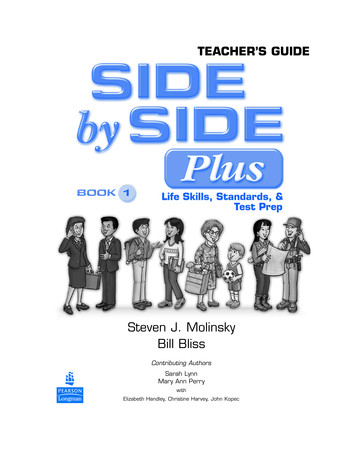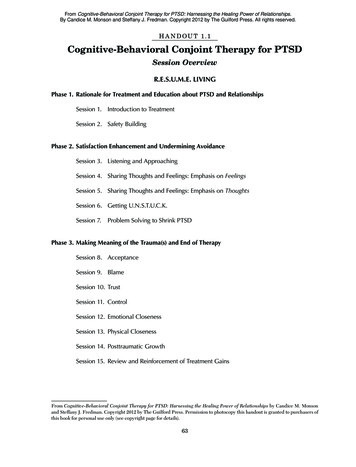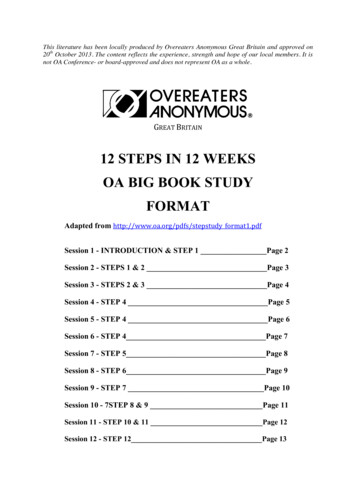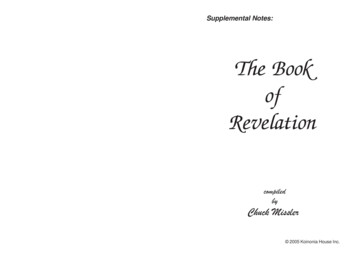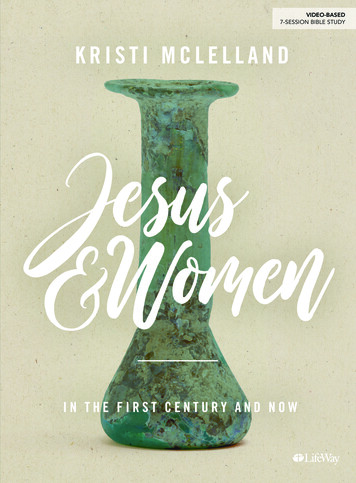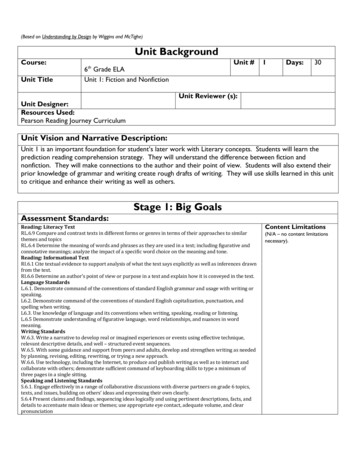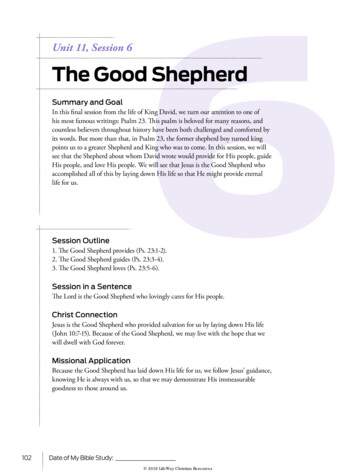
Transcription
Unit 11, Session 66The Good ShepherdSummary and GoalIn this final session from the life of King David, we turn our attention to one ofhis most famous writings: Psalm 23. This psalm is beloved for many reasons, andcountless believers throughout history have been both challenged and comforted byits words. But more than that, in Psalm 23, the former shepherd boy turned kingpoints us to a greater Shepherd and King who was to come. In this session, we willsee that the Shepherd about whom David wrote would provide for His people, guideHis people, and love His people. We will see that Jesus is the Good Shepherd whoaccomplished all of this by laying down His life so that He might provide eternallife for us.Session Outline1. The Good Shepherd provides (Ps. 23:1-2).2. The Good Shepherd guides (Ps. 23:3-4).3. The Good Shepherd loves (Ps. 23:5-6).Session in a SentenceThe Lord is the Good Shepherd who lovingly cares for His people.Christ ConnectionJesus is the Good Shepherd who provided salvation for us by laying down His life(John 10:7-15). Because of the Good Shepherd, we may live with the hope that wewill dwell with God forever.Missional ApplicationBecause the Good Shepherd has laid down His life for us, we follow Jesus’ guidance,knowing He is always with us, so that we may demonstrate His immeasurablegoodness to those around us.102Date of My Bible Study: 2019 LifeWay Christian Resources
Group TimeGROUP MEMBER CONTENTIntroductionEXPLAIN: Share the context and the quote in the DDG (p. 84) in which Winston Churchill addressed hischallenge of instilling hope in his people while being honest about their difficult situation in World War II.In the throes of World War II, with the fate of humanity on the line, the great BritishPrime Minister Winston Churchill stood up and addressed the House of Commons.His task was a difficult one. He needed to provide his people with hope in the face ofthe seemingly unstoppable German war machine. But at the same time, he needed tobe honest; the English people knew what was happening on the continent of Europe.And so, on January 22, 1941, Churchill stood before the gathered government officialsand declared:“Far be it from me to paint a rosy picture of the future. Indeed, I do not think weshould be justified in using any but the most sombre tones and colours while our people,our Empire and indeed the whole English-speaking world are passing through a darkand deadly valley. But I should be failing in my duty if, on the other wise, I were not toconvey the true impression, that a great nation is getting into its war stride.” 1INTERACT: Ask group members the following questions.When have you felt like you were walking through a “dark and deadlyvalley”? Where did you turn for hope? (be prepared to give answers ofyour own to jump-start the conversation)SAY: As believers in Christ, we too are not promised a rosy picture of the future in this life. However, unlikeGreat Britain and her allies in World War II, believers have a Good Shepherd who provides for them, guidesthem, loves them, and assures their victory. Therefore, we do not look over life’s difficulties but through them toJesus, our Good Shepherd.SUMMARIZE: In Psalm 23, the former shepherd boy turned king points us to a greater Shepherd and Kingwho was to come. In this session, we will see that the Shepherd about whom David wrote would provide for Hispeople, guide His people, and love His people. We will see that Jesus is the Good Shepherd who accomplished allof this by laying down His life so that He might provide eternal life for us.For session-by-session training videos, please visit MinistryGrid.com/GospelProject.For additional teaching options and other resources, please visit GospelProject.com/additional-resources.Unit 11, Session 6 2019 LifeWay Christian Resources103
Point 1: The Good Shepherd provides (Ps. 23:1-2).READ Psalm 23:1-2 (DDG p. 85).The Lord is my shepherd; I have what I need.He lets me lie down in green pastures;he leads me beside quiet waters.12EXPLAIN: Note that three truths about the Lord’s provision are discovered here. Then use the paragraphs inthe DDG (p. 85) and the leader content below to help explain the Lord’s provision as powerful and personal.In these first two verses of Psalm 23, we discover three truths about the Lord’sprovision to David, and to us:1. The Lord’s provision is powerful. Of the many different names we have for God,David used the covenant name “the Lord” to open this psalm. This is the name Godrevealed to Moses at the burning bush: “I AM WHO I AM” (Ex. 3:14). God sharedthis name with Moses to set Himself apart from the false gods of the Egyptians. TheLord alone is the one true God, the Creator God; He alone is all-powerful. Th e Lord’s provision is powerful. Here David connects God’s holy name, “the Lord,” or “Yahweh,”with God being a shepherd. The Great I AM is also the Great Shepherd. The One who gives life andbreath to all humanity, the One who created everything, the One who parted the waters of the RedSea for His people to cross on dry ground is the One who provides for His sheep. The all-knowing,all-powerful, all-loving God provides for every need His people have, even the most basic ones.2. The Lord’s provision is personal. David could have chosen a war metaphor todescribe the Lord. “Warrior,” “king,” and “sword and shield” all would have been fittingand were used elsewhere of the Lord (see Ex. 15:3; Ps. 24; Deut. 33:29, respectively).Instead, David opted for a personal one—shepherd—and his use of the personalpronoun “my” heightens this. God wasn’t just a shepherd, He was David’s shepherd. Th e Lord’s provision is personal. David had been a wildly successful warrior in Saul’s army, so heknew firsthand the power of warrior imagery. Yet he chose to describe God as a shepherd. Having beena shepherd prior to becoming a warrior, David was well-acquainted with a shepherd’s responsibilitiesand expectations. He knew how difficult sheep were to lead and that their sole chance of survivalrested on the effectiveness of their shepherd. He understood that shepherds were with their sheep up totwenty-four hours a day, which explains why Jesus in the New Testament could say, “My sheep hear myvoice, I know them, and they follow me” (John 10:27). David chose the metaphor of a shepherd becauseit communicates a personal God who cares deeply about His people. The Creator God is not a far off,detached monarch; He is an up-close and involved protector of those who belong to Him.104Leader Guide 2019 LifeWay Christian Resources
INTERACT: Ask group members the following question.How should God’s provision being personal affect the way we viewour circumstances? (God knows us and knows what we need in life andwhat we don’t need; we can trust that our circumstances, no matter howpleasant or dire, are tailor-made for our good and God’s glory; findingourselves in a situation of lack should drive us to God not with complaintsbut with prayers for His provision and our contentment)EXPLAIN: Use the paragraph in the DDG (p. 85) and the leader content below to help explain the Lord’sprovision as purposeful.3. The Lord’s provision is purposeful. Sheep are known for being helpless, so theirshepherd is assigned to lead them and make sure their needs are taken care of. Hedirects them to places where they can rest in green pastures with plenty to eat and theycan find refreshment from the quiet waters of a slow-moving stream. Thus, a purpose ofthe Lord’s provision is to give you all that you need so you will trust and rest in Him. Th e Lord’s provision is purposeful. David knew that sheep are inherently timid and are usually tooafraid to lie down, even for their own good. But in a rare moment of confidence and trust in theirshepherd, sheep will lie down when they experience “freedom from fear, tension, aggravations, andhunger.” 2 Though David’s path likely was difficult as he wrote this psalm, he was convinced that the Lordwas providing what he needed for his good. The level to which you believe this is the extent to which youwill trust Him and step out in obedience.INTERACT: Ask group members the following question.Why do we find it difficult to rest in the Lord’s provision? (we havenot allowed ourselves to be trained by His provision in the past; westruggle to trust someone else with our needs; we have little faith in ourGod’s ability and desire to care for us; we believe our sin will make Godvindictive; because God doesn’t always provide like we think He should)SAY: The Lord our shepherd has promised to provide every one of our needs according to His riches and gloryin Christ Jesus (Phil. 4:19). As a Christian, contentment in the Lord begins with a confidence in the Lord’sprovision. All that we need, He gives, and all that He gives has a purpose. We should receive the Lord’s provisionwith gratitude and joy and use it to bring glory to the One who provided it to us (1 Cor. 10:31).Unit 11, Session 6 2019 LifeWay Christian Resources105
Point 2: The Good Shepherd guides (Ps. 23:3-4).READ Psalm 23:3-4 (DDG p. 86).He renews my life;he leads me along the right paths for his name’s sake.4Even when I go through the darkest valley,I fear no danger, for you are with me;your rod and your staff—they comfort me.3EXPLAIN: Reference the first paragraph in the DDG (p. 86) as you highlight two right paths on which Jesusleads us: the vertical path and the horizontal path.Countless wrong paths exist in this world, and we have seen people, even ourselves, fallprey to many of them. It is good, then, to be reminded that Christ, the Good Shepherd,leads us along the right paths. Two such paths are the vertical path (walking humblywith our God) and the horizontal path (walking lovingly with each other). The Vertical Path. The first four of the Ten Commandments describe our vertical relationship with God(Ex. 20:1-11), a path we are to walk along with humility (Mic. 6:8). One of the best ways to do so is towalk daily in His Word. Psalm 119:105 reminds us that God’s Word is a lamp to our feet and a light onour path. As we spend time reading the Bible, we will see how we are to live in relationship with God andwalk along His path, the right path He has given us. The Horizontal Path. We are also to walk lovingly with each other, as summarized in the last six ofthe Ten Commandments (Ex. 20:12-17). We were not created for isolation; we were created to be incommunity, reflecting the nature of our triune God. The church, therefore, is a vital part of a believer’sjourney with God into spiritual maturity. Again through God’s Word, we are told to encourage eachother (1 Thess. 5:11), love each other (1 John 4:7), forgive each other (Col. 3:13), accept each other(Rom. 15:7), serve each other (Gal. 5:13), speak the truth to each other (Eph. 4:25), and pray for eachother (Jas. 5:16).INTERACT: Ask group members the following question.How would you describe some wrong paths in this world? (broad pathsleading to death and destruction; paths of selfishness; paths on whichyou follow your heart; paths focused on fame and fortune; paths forsexual fulfillment apart from God’s will; paths of bitterness; paths ofhate; the hell-bound path)106Leader Guide 2019 LifeWay Christian Resources
EXPLAIN: Use the paragraphs in the DDG (p. 86) to explain why the Lord’s rod and staff provided Davidwith comfort and boldness even on the path in the dark valley.For David, even in the dark valley, he had nothing to fear. How could he say that?Because the Lord was with him as a shepherd with his rod and staff in hand. The rod represented God’s power. A rod was a club that shepherds carriedto fend off wild animals that wanted to harm their sheep. The rod wasa symbol of safety. Similarly, as believers in Christ, we are told that ourShepherd walks before us protecting us with His power (Ps. 118:6). e staff represented God’s grace. The shepherd’s staff was used to pullThsheep out of hazardous situations, such as thickets or crevices. So too, forbelievers, we find ourselves in hazardous situations resulting from our sin,and it is God’s grace that pulls us out.The Lord’s rod and staff—His power and grace—comfort the believer even in thedarkest of valleys because they are not for our harm but for our good.INSTRUCT: Allow group members a moment to reread the Scripture passage and to draw in the spaceprovided in their DDG (p. 86) a meaningful visual element from the passage surrounded by words or picturesthat elaborate on it (examples: a dark valley filled with words describing their own dark valley; a rod surrounded bywords describing God’s power). Ask for any volunteers to share about their drawing, but don’t force any responses.EXPLAIN: Emphasize that God’s guidance is for our good, but God’s ultimate motivation is His glory. No doubt the Lord our Shepherd leads us on right paths and protects us with His rod and staff for ourgood, but we should take note of the ultimate motivation for His guidance: His name’s sake (v. 3). All thatGod does is for our good and especially His glory, and these are not mutually exclusive. W e are not the center of the Lord’s universe; He is. This truth should keep us from thinking more highlyof ourselves than we ought and getting puffed up with pride (Rom. 12:3). He created us for His gloryand redeems people for the praise of His glorious grace. In a world that makes everything about you, Goddoesn’t. Much of our culture is about exalting humanity, but the gospel is about exalting God!Unit 11, Session 6 2019 LifeWay Christian Resources107
Point 3: The Good Shepherd loves (Ps. 23:5-6).SAY: In these final two verses of Psalm 23, the imagery shifts from primarily one of a shepherd relating to hissheep to a friend or host relating to another friend or esteemed guest.READ: Ask a volunteer to read Psalm 23:5-6 (DDG p. 87).You prepare a table before mein the presence of my enemies;you anoint my head with oil;my cup overflows.6Only goodness and faithful love will pursue meall the days of my life,and I will dwell in the house of the Lord as long as I live.5EXPLAIN: Use the first paragraph in the DDG (p. 87) to point out the significance of the Lord’s hospitalitytoward David in the presence of his enemies: he experienced joy and contentment.Israel’s culture valued hospitality, and part of being a gracious host was preparingfor and feeding a guest. The Lord’s preparation in this passage, however, was uniquebecause it came in the midst of trouble. The Lord prepared a table in the presence ofthe psalmist’s enemies. Even while oppressed, David experienced joy, symbolized by hishead anointed with oil, and contentment, seen in his cup overflowing. His enemies mayhave been waiting outside to harm him, but he was inside enjoying a good, bountifulmeal prepared by the Good Shepherd, his loving host.INTERACT: Ask group members the following questions.What images come to mind about a table characterized by joy andcontentment? Why are these memories meaningful for you? (beprepared to give answers of your own to jump-start the conversation,hopefully ones that communicate the love felt around a table)EXPLAIN: Use the second paragraph in the DDG (p. 87) to emphasize David’s confidence in God’s goodnessand faithful love, also translated as mercy.In addition to his joy and contentment, David was confident in the Lord’s goodness andfaithful love in the midst of his troubles. God is good and God is love, and David hadexperienced God’s goodness and love in the past. But David also knew he needed God’slove, mercy, and grace day by day. That was precisely what God would pursue him withthroughout the rest of his life.108Leader Guide 2019 LifeWay Christian Resources
D avid had recognized God’s goodness and love in choosing him to be king, in defeating Goliath, inhis friendship with Jonathan, and in sparing his life from Saul. But perhaps there had been no greaterevidence of God’s goodness and love than in God’s forgiving David of his adultery with Bathsheba andhis murder of her husband, Uriah. To pardon David of such heinous sins was an undeserved act of God’slove that surely reverberated throughout the rest of the king’s life. God’s pardon had been sweet, andbecause of it, David was able to experience a renewal of his fellowship with God (Ps. 51). Th ere is no sin so small that God’s love and goodness aren’t needed. There is no sin so great that God’slove and goodness can’t cover it.FILL IN THE BLANKS: Provide group members with the answers for the call-out in their DDG (p. 87).God Is Love: To say that God is love isto say that God is the essence of love,or that perfect love both resides andresonates within God Himself—oneGod in three Persons. The greatest actof love by God toward humans isn’t thegiving of earthly goods but the givingof Himself in Christ so that we mightbecome reconciled to Him.Voices fromChurch History“ Christ’s love towards us,and not our love towardsChrist, is the true groundof expectation, and truefoundation of hope Tolook inward to our lovetowards Christ is painfullyunsatisfying: to lookoutward to Christ’s lovetowards us is peace.” 3–J. C. Ryle (1816-1900)Essential Doctrine “God Is Love”: To say that God is love is tosay that God is the essence of love, or that perfect love both resides and resonates within God Himself—oneGod in three Persons. The imperfect love that human beings share between one another is a dim reflection,a sign that points to the perfect love that resides within God. The greatest act of love by God towardhumans isn’t the giving of earthly goods but the giving of Himself in Christ so that we might becomereconciled to Him.SAY: Goodness and faithful love followed David then, and goodness and love follow believers now because thegreater David, the greater Shepherd, followed His Father’s plan to the point of death, even to death on a cross(Phil. 2:8). The first David took a life to cover his sin, but the second David gave His life to cover our sins and toshepherd us in the right paths on the way to His eternal home.Unit 11, Session 6 2019 LifeWay Christian Resources109
My MissionEXPLAIN: Winston Churchill’s words during World War II brought comfort, encouragement, and hope to hispeople, but not a sure hope. Psalm 23, however, encourages believers to look to Christ as the Good Shepherd wholoves us and laid down His life for us, His sheep (John 10:7-15). We are to read this psalm and have a sure hopethat we will dwell with God forever. Therefore, just as Jesus laid His life down, we can lay our lives down for thesake of sharing the gospel with the countless sheep among the nations who do not yet know the Good Shepherd.READ the following missional application statement in the DDG (p. 88), and encourage group membersto choose at least one of the options below as a way to respond to the truth of God’s Word.Because the Good Shepherd has laid downHis life for us, we follow Jesus’ guidance,knowing He is always with us, so thatwe may demonstrate His immeasurablegoodness to those around us.Voices fromChurch History“ There is a differencebetween him, who is ledby the good Shepherd, andhim, who is led captiveby the devil at his will;between him, who feedsin the green pastures, andhim, who feeds on vanity.Oh that men saw thisdifference as they ought.” 4 W hat step of faith will you takebecause the Good Shepherdprovides for, guides, and lovesHis sheep? W hat are some ways your groupcan encourage one another tofollow the Shepherd’s guidance inHis Word? How will you lay down your life to share the gospel with someone elsethis week, following in the example of Jesus, the Good Shepherd?–William S. Plumer(1802-1880)CLOSE IN PRAYER: Lord Jesus, You are the eternal Son of God and our good and faithful Shepherd.Though we, like sheep, have gone astray, You took on human flesh and became the Good Shepherd we needed,laying down Your life for our good and for Your Father’s glory. You are with us always, even through the darkestvalleys, as You lead us by the Holy Spirit according to Your goodness and faithful love. Amen.PACK ITEM 10: HYMN HANDOUT: Pass out copies of this hymn and sing it together.INSTRUCT: As your group departs, encourage group members to read and respond to the Daily Studydevotions in their DDG (pp. 89-91), which build and expand upon the group study. Also advocate for smallgroups or families to use Encourage One Another (p. 92) for mutual accountability and fellowship groundedupon the foundation of God’s Word.110Leader Guide 2019 LifeWay Christian Resources
Daily DiscipleshipThroughout the week following the session, use the ideas below to remind and encourageyour group members to live as disciples of Jesus Christ. The Daily Study devotions in theDDG (pp. 89-91) will help group members get into God’s Word and study it for themselves.Encourage One Another (p. 92) will help group members and families fellowship with oneanother with purpose.Daily StudyBrief daily devotions in the DDG (pp. 89-91) will help group members take initiative intheir own discipleship. Make sure all group members have access to a Bible to read. Have some Biblesavailable to give to guests who may need one, or offer to get one and arrange a timeto meet to give it and show how to navigate it for the devotions. Share the following idea from the devotion for Day 2 as a part of point 2 in thesession: Trusting in Christ does not shield us from danger, pain, and adversity. Infact, the Bible has more to say about how these things will increase, not decrease,because of our faith.Consider leading by example and reading the daily devotions yourself with your own DDG.Based on your study, use brief messages throughout the week (group text, email, socialmedia) to encourage your group to keep up with their daily time in God’s Word and to liveit out. Here are a couple of examples you can use: Day 1: “Sometimes God will not give us our desires even if they seem to begood desires and even if we have the best of intentions for wanting them.” D ay 4: “Our powerful Creator is also our gentle Father. He is always there forus, always knowing what we need, and always ready to provide.”Visit www.GospelProject.com/Blog for additional content and resources you can use tohelp group members gain more insight into their daily studies. Send group members a linkor a portion of a blog post or other content that you believe will be helpful and encouragingfor their time in God’s Word.Encourage One AnotherThis brief plan for fellowship and accountability in the group member’s DDG (p. 92) willhelp groups of 2-4 people to meet sometime during the week to reflect on the session andto share how God is working and they are responding. It could also be used for familydiscipleship with students and children who are using The Gospel Project in their groups. Encourage group members to live as representatives of God’s shepherdinggoodness by speaking the truth of God’s Word into others’ lives. S ee yourself as a member of the group who also needs encouragement in the faith,and participate in such a group this week.Unit 11, Session 6 2019 LifeWay Christian Resources111
Additional CommentaryPoint 1: The Good Shepherd provides (Ps. 23:1-2).“Because the Lord is his shepherd, the psalmist can declare, I lack nothing (23:1b).In the dry climate of West Asia, sheep were very dependent on their shepherd to findfood, water and protection. Each day, he would lead the flock to new green pastures,which often provided only enough grass for that day (23:2a). Yet the phrase he makesme lie down shows that the sheep had enough to eat. The sheep also needed daily accessto quiet waters, calm streams or pools in contrast to rapidly flowing water that couldendanger them (23:2b).” 5“This hymn is usually classified as a psalm of confidence in the Lord’s care. It usestwo images: the Lord as Shepherd who cares for the sheep (vv. 1-4), and the Lord asHost who cares for his guest (vv. 5-6). These images would be familiar from everydayexperience (for David’s own, cf. 1 Sam. 17:34); but they also evoke other ideas commonin the ancient Near East (including the OT), with the deity as shepherd of his peopleand the deity as host of the meal. In worship, the faithful celebrate God’s greatness andmajesty; and when they sing this psalm, they see his majesty in the way he personallyattends to each of his covenant lambs. He is the shepherd for Israel as a whole; and inbeing such, he is the shepherd for each faithful Israelite as well.” 6“Psalm 23 reflects David’s experience (cf. 1 Sam. 17:34-37). The shepherd image impliesthat God accepts the responsibility to care for those who know him. His prioritiesare to keep them spiritually healthy and growing (food, water, rest, restoration andguidance, Ps. 23:1-3). Though they are not protected from “the darkest valley,” theshepherd is always there to protect them through it (Ps. 23:4). Rooted in ‘goodness andmercy’ (Ps. 23:6), the preplanned richness of God’s care gives David confidence to facewhatever the future may bring. All that matters is to be with him.” 7Point 2: The Good Shepherd guides (Ps. 23:3-4).“Shevet means rod. It indicates shepherds’ rods (Ezek. 20:37), used for counting(Lev. 27:32) or protection (Ps. 23:4). Shevet is also associated with applying discipline(Prov. 13:24). Used symbolically of fury’s power (Prov. 22:8), shevet as scepter connotesdiscipline (Isa. 11:4) or punishment (Job 37:13). Assyria was the rod of God’s angeragainst Israel (Isa. 10:5). Shevet can be a military weapon, a club (2 Sam. 23:21) orspear (2 Sam. 18:14). Shevet as a symbol of power meant scepter (Gen. 49:10) or staff(Judg. 5:14) of rule. It could represent one kingdom’s destructive power over another(Isa. 14:29). A scepter of justice implies righteous rule (Ps. 45:6). Shevet apparentlybecame identified with those ruled in the most common denotation tribe. The phrase‘tribes of Israel’ occurs forty-eight times (Gen. 49:28). Israel can be a shevet (Jer. 10:16).” 8112Leader Guide 2019 LifeWay Christian Resources
“Moreover, this good shepherd restores my soul. This statement is subject todifferent interpretations. It may picture the straying sheep being brought back to thefold (cp. Isa. 49:5; Ps. 60:1). In Hebrew vernacular these words can mean ‘brings torepentance’ or ‘brings to conversion’ (cp. Hos. 14:1-3; Joel 2:12). Psalm 19:7 uses thissame wording to picture the spiritual renewal or revival of a believer. But since theword for soul (Heb. nephesh) is accurately translated ‘life,’ this may mean that the Lordrestores the psalmist to physical health. Either interpretation is certainly true.” 9“The ‘darkest valley’ (sometimes translated the ‘valley of the shadow of death’) does notmean that the psalmist died, only that he might find himself in a situation where deathwas a distinct possibility. The phrase ‘the darkest valley’ alludes to the deep canyons inthe wilderness into which one might fall and not escape unless God intervened.” 10Point 3: The Good Shepherd loves (Ps. 23:5-6).“His experience of the Lord’s blessing convinced the psalmist that the Lord will neverleave him nor forsake him (23:6a). Goodness and love, literally ‘well-being and covenantloyalty,’ will not just follow him but pursue him (the same Hebrew verb is often used inreference to pursuit of an enemy). The psalmist’s enemies are no longer pursuing him;their place has been taken by God’s goodness and covenant loyalty! And this pursuitwill continue not just for a few hours but for a lifetime.” 11“The ‘house of the Lord’ is the sanctuary where people worshiped. (The temple, in theHebrew OT, is usually called beth Yahweh, ‘the Lord’s house.’) After his meditations,David desired to return to that holy place where he could avail himself of the blessingof God’s presence. In the Christian application of the psalm, the hope is for completecommunion with the Lord in the abundance of His blessing. While popular thinkingoften relates this verse to heaven, the phrase ‘in the presence of my enemies’ (v. 5)suggests an earthly setting, since the believer’s enemies are not present in heaven.” 12References1. Winston Churchill, quoted in Winston Churchill: British Prime Minister & Statesman, by Sue Vander Hook (Edina, MN: ABDOPublishing Company, 2009), 75.2. W. Phillip Keller, A Shepherd Looks at Psalm 23 (Grand Rapids, MI: Zondervan, 1970), 33-34.3. John Charles Ryle, Practical Religion (Grand Rapids, MI: Baker, 2018), 263.4. William S. Plumer, Studies in the Book of Psalms (Philadelphia, PA: J. B. Lippincott & Co., 1866), 319.5. Augustine Pagolu, Jesudason Baskar Jeyaraj, Eliya Mohol, David Clarence, and Ajoy Kumar Lama, “Psalms,” in South AsiaBible Commentary, gen. ed. Brian Wintle (Grand Rapids, MI: Zondervan, 2015), 639.6. C. John Collins, “Psalms,” in ESV Study Bible (Wheaton, IL: Crossway, 2008), 966.7. Gwynneth Marian Napier Raikes, “Psalms,” in The IVP Women’s Bible Commentary, eds. Catherine Clark Kroeger, Mary J.Evans, and Elizabeth Kroeger Elliott (Downers Grove, IL: IVP, 2011) [Wordsearch].8. “Shevet,” in CSB Study Bible (Nashville, TN: B&H, 2017), 837.9. Steven J. Lawson, Psalms 1–75, in Holman Old Testament Commentary (Nashville, TN: B&H, 2009) [Wordsearch].10. Allen P. Ross, “Psalms,” in The Apologetics Study Bible (Nashville, TN: B&H, 2007), 810, n. 23:4.11. Augustine Pagolu, Jesudason Baskar Jeyaraj, Eliya Mohol, David Clarence, and Ajoy Kumar Lama, “Psalms,” in South AsiaBible Commentary, gen. ed. Brian Wintle, 639-40.12. Allen P. Ross, “Psalms,” in The Apologetics Study Bible, 810-11, n. 23:6.Unit 11, Session 6 2019 LifeWay Christian Resources113
A Word from the EditorThe Gospel Project Adult Leader Guide CSBVolume 7, Number 4 Summer 2019Ed StetzerFounding EditorTrevin WaxGeneral EditorBrian DembowczykManaging EditorDaniel DavisContent EditorJosh HayesContent and Production EditorKen BraddyManager, Adult Ongoing Bible StudiesMichael KelleyDirector, Groups MinistrySend questions/commen
104 Leader Guide Point 1:he Good Shepherd provides (Ps. 23:1-2). T READ Psalm 23:1-2 (DDG p. 85). 1s my shepherd; I have what I need.The Lord i 2 He lets me lie down in green pastures; he leads me beside quiet waters. EXPLAIN: Note that three truths about the Lord's provision are discovered here. Then use the paragraphs in the DDG (p.
